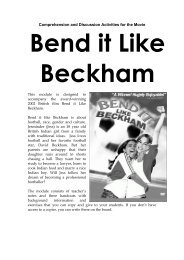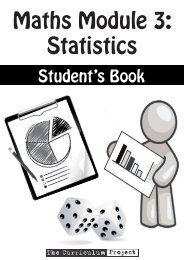History of Burma: A Multi-ethnic Perspective - The Curriculum Project
History of Burma: A Multi-ethnic Perspective - The Curriculum Project
History of Burma: A Multi-ethnic Perspective - The Curriculum Project
Create successful ePaper yourself
Turn your PDF publications into a flip-book with our unique Google optimized e-Paper software.
Current issuesOBJECTIVES AND KEY CONCEPTS:group workStudents work in groups <strong>of</strong> four or ive, and brainstorm a list <strong>of</strong> topical issues about <strong>Burma</strong> at the moment. Agood starting point might be to think about what is in the media about <strong>Burma</strong>. Groups read their lists to theclass.discussion- current issues related to <strong>Burma</strong>—topics can be student generated from the news. Some ideasinclude education, health, human trafficking, drugs, prostitution, AIDS, and political developments-consider their relevance and importance to the present situation- discuss these issues and compare their current status to the pastLook at a few issues mentioned by a few groups. Discuss these issues with the class—make connectionsbetween the past, present and the future. For example:- <strong>Burma</strong> was criticized recently for not doing enough to stop drug production. One <strong>of</strong> the maingroups accused <strong>of</strong> drug smuggling is the United Wa State Army, a ceasefire group. When they` signed a ceasefire, they were allowed to keep their weapons and control an area in Shan state.In the future, they might not be able to smuggle drugs as easily because Thailand and theinternational community are increasing their efforts to stop the drug trade.homeworkStudents choose an issue and research it. <strong>The</strong>y should find some new information about their topic either fromthe media, books, and talking to people who have experience with their topic. <strong>The</strong>y should show where theygot their information from, e.g.:- More Palaung farmers are growing opium due to the decline in the tea industry (from areport by the Palaung Women’s Organization, 2006)- “Our soldiers sometimes catch drug smugglers near the border” (interview with KNLAcommander)Timeline reviewOBJECTIVES AND KEY CONCEPTS:- review the events studied in the module- prioritize events in terms <strong>of</strong> relevance to student’s personal situation and experience- compare the timelines students made at the beginning <strong>of</strong> the unit;exercisesStudents look over their timelines and compare them to the timelines they made at the beginning <strong>of</strong> thismodule. Students write a list <strong>of</strong> new things they have learned and that did not know before studying thismodule. In particular, what things did they learn about their own life and background? Students write shortanswers to the questions.group workStudents discuss their answers in groups.reviewStudents write history books. You may want to give a word count, e.g., this must be at least 300 or 500 wordslong. You may decide they must use English or their own language. Encourage students to do research, ratherthan just use information from the module, and reference any information to its source (see example above).When they have finished, they copy or type it onto folded paper, like a published book, and add illustrations ifpossible. Encourage students to read each other’s books, and/or maybe pass them on to a high school nearby.94


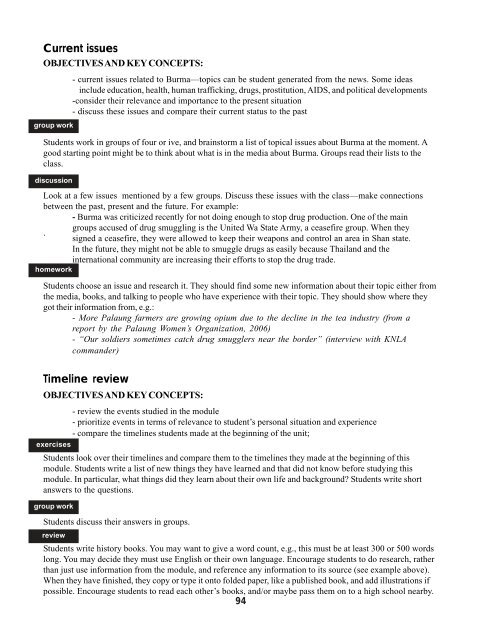
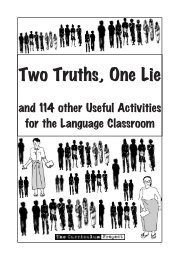
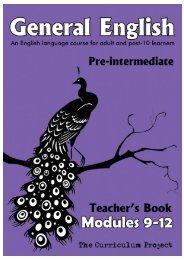
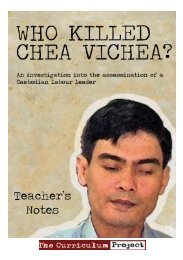
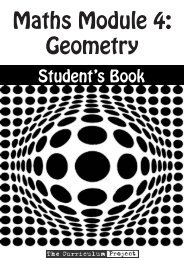

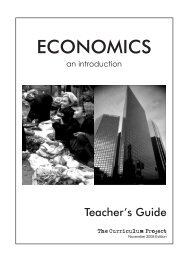
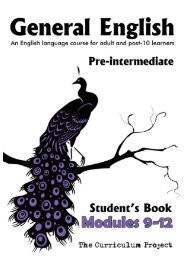

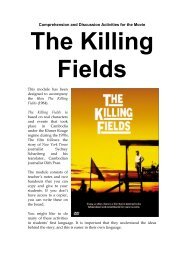
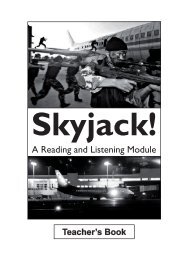
![[Eng] Nov 2012 DRAFT - The Curriculum Project](https://img.yumpu.com/45590859/1/184x260/eng-nov-2012-draft-the-curriculum-project.jpg?quality=85)
